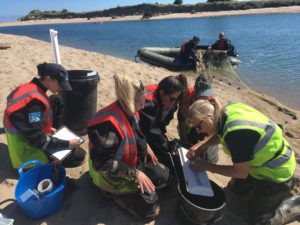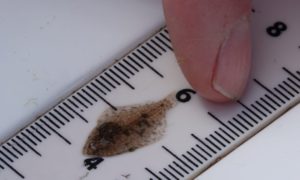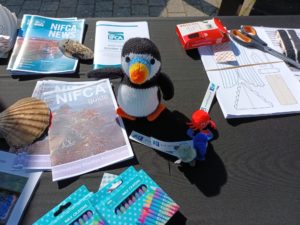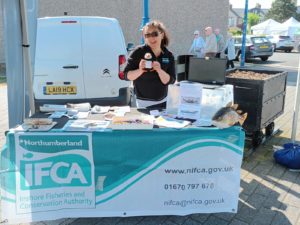The Environment Agency will be conducting scientific kelp surveys along the Northumberland coast area during July and August 2024. Please see link below for further information:-
Limits of NIFCA District
During June we conducted the latest Aln Estuary Survey. The Aln Estuary Marine Conservation Zone (MCZ) is the smallest designated MCZ in the UK, covering an area of just 38.5 hectares.
In May 2012, the Northumberland Inshore Fisheries and Conservation Authority (NIFCA) conducted a pilot survey to study juvenile and small fish populations in the estuary, recognising its potential significance for young fish.
Since 2015, NIFCA has conducted biannual fish surveys in late spring and early autumn to gather data on fish population dynamics. The primary aim of these surveys is to understand the variety of fish species in the estuary and the role it plays as a crucial spawning and nursery ground for North Sea fish.
The surveys help identify the abundance of fish communities at each site and collect additional data on the estuary’s physical and chemical properties, such as temperature and salinity.
The fish surveys follow the Environment Agency’s Transitional and Coastal Monitoring (TrAC) method. Over eight years, 16 surveys have been conducted, recording a total of 7,473 fish, with 4,689 (63%) measured. The 2023 results were compared with previous years to assess the site’s significance as a nursery and to monitor any changes over time.
The 2024 survey results will be available later in the year and will build on the key findings from our 2023 survey, which identified a total of 13 species identified to species level and two to genus level. In spring 2023, 10 species and two genera were identified, while in autumn, 11 species and one genus were identified.
All the commercial species measured were juveniles, except for trout and a small percentage of adult sandeels (22% lesser sandeels and 7% greater sandeels). The most abundant species recorded was the Atlantic herring, with 706 individuals, marking the highest recorded species abundance in a single sample.
The 2023 survey results reaffirmed the Aln Estuary MCZ’s importance as a nursery ground for various fish species, notably commercial species such as lesser and greater sandeel, Atlantic herring, European flounder, and European eel. It is important to note that sandeel and European eel both have prohibitions for commercial fisheries in the UK.
The estuary’s diverse habitats support a wide range of juvenile species, with certain habitats preferred by specific species (e.g. saltmarsh for Atlantic herring and European flounders, sublittoral sand for lesser and greater sandeels).
The continued high abundances, low variation in species richness and consistent yearly recordings of six species suggest stable conditions in the MCZ, achieving its conservation objective to “Maintain in favourable condition.”
However, the factors affecting fluctuating population dynamics remain uncertain. Temperature and salinity data collected since 2015 have not shown clear trends, possibly due to the estuary’s low temporal and spatial temperature range or external factors like offshore impacts on spawning grounds. Salinity readings have varied more widely but haven’t revealed consistent correlations with species richness and abundance.
For more detailed information, please refer to the 2023 Aln Estuary report at: https://nifca.gov.uk/wp-content/uploads/2024/05/Aln-Report-2023-Final.pdf
Overall Results (2015 – 2023)
Consistent Species: Six species exhibited site fidelity, being recorded every year, while five species were only recorded once.
High Abundance: The most abundant species over the years were lesser sandeel (2,102 individuals), Atlantic herring (1,851), and goby species (1,347), accounting for 73% of all individuals recorded.
Species Richness: Inter-annual species richness showed little variation (Sorensen Index Similarity score of 90% – 64%), but population dynamics fluctuated significantly both inter- and intra-annually (Bray Curtis Index Similarity Score of 80% – 16%).

Limits of NIFCA District
During May, the Northumberland Inshore Fisheries and Conservation Authority (NIFCA) made its annual appearance at the Amble Puffin Festival, an event celebrating the region’s marine life.
Each year, NIFCA supports the festival to connect with the local community and share insights into our work in managing and conserving Northumberland’s inshore waters.
Our officers Vicky Rae and Richard Willis manned NIFCA’s booth, which was a hub of activity, offering interactive displays and educational materials. Visitors learned about sustainable fishing practices, habitat protection and marine biodiversity. The NIFCA team provided information on key topics including sustainable fishing practices, minimum size limits and research work undertaken as well as ways anglers can contribute to the data held on finfish by entering our species challenge competition.
Habitat protection was also a key area, covering the safeguarding of critical habitats such as seagrass beds and rocky reefs and marine species conservation.
Hands-on learning and engaging with the community
Children enjoyed fish identification games, fostering early interest in conservation. The festival also facilitated discussions between NIFCA officers and local fishers, helping to promote collaboration and mutual understanding.
NIFCA’s annual participation in the Amble Puffin Festival not only educates the public but also strengthens community ties, reinforcing the collective effort to protect Northumberland’s marine heritage.
Festival facts
The Amble Puffin Festival celebrates everything Puffin at the best time of year to see the Coquet Island puffins, as they prepare to take care of their newly hatched pufflings.
The festival takes inspiration from a colony of approximately 30,000 puffins that nest on the RSPB seabird sanctuary of Coquet Island, just a mile off Amble. Puffins are very sociable birds that like to nest in burrows in the soft sandy soil on the island, which equates to more than 15,000 burrows.
Coquet Island has been an RSPB nature reserve since 1970 and is also the sole UK nesting colony of roseate terns. The island is a Site of Special Scientific Interest and therefore protected all year round, to safeguard the fragile habitat.
Limits of NIFCA District
Please note that our next Quarterly Meeting will be held at the NIFCA Office, 8 Ennerdale Road, Blyth, Northumberland, NE24 4RT on Monday 22nd July 2024 at 1pm.
The meeting is open to all. If you have any queries or would like to attend, please email nifca@nifca.gov.uk
Limits of NIFCA District
Northumberland’s fisheries management landscape is undergoing significant changes as key figures retire and new faces step up to lead the charge in marine conservation and sustainable fishing practices.
After an illustrious 15-year tenure, Les Weller, Chair of the Northumberland Inshore Fisheries and Conservation Authority (NIFCA), has announced his retirement. Les leaves behind a legacy of unwavering dedication to sustainable fisheries management and the preservation of marine ecosystems. His departure marks the end of an era characterised by tireless advocacy and impactful leadership.
Replacing Les at the helm is Amelia Henderson, a respected recreational angler and staunch advocate for marine conservation. Amelia has been a volunteer member of NIFCA since 2022 and is Secretary of the Bedlington Sea Angling Club. She brings a wealth of experience and a deep commitment to environmental stewardship to her new role. Her appointment signals a continuity of NIFCA’s values and a renewed focus on collaborative efforts to protect North East coastal waters and marine biodiversity.
Commenting on Les’s retirement and Amelia’s appointment, Mark Southerton, Chief Officer of NIFCA, expressed gratitude for Les’s exemplary public service.
“Les has been a steadfast pillar of support for NIFCA, embodying our values of dedication and passion for marine conservation. His leadership and support have been instrumental in our achievements over the past 15 years, and he leaves behind a legacy that will continue to inspire us.”
Incoming chair Amelia expressed her commitment to building upon Les’s legacy by fostering collaboration among stakeholders, fishing communities and conservation groups.
She said: “I am deeply honoured to follow in Les’s footsteps and eager to embark on this new journey. I am committed to working hand in hand with all of our stakeholders to preserve our coastal waters and uphold our rich marine biodiversity.”
In addition to the change in leadership, NIFCA also welcomes new members to its ranks. Jim Stephenson, a commercial fisher and NIFCA member for more than 28 years, has retired from his position.
He will be succeeded by Brian Douglas, bringing fresh perspectives and expertise to the Authority’s endeavours. Furthermore, Guy Renner-Thompson has been nominated to serve as vice chair, further strengthening NIFCA’s leadership team.
“Jim Stephenson has been a cornerstone of NIFCA’s efforts for over 28 years, and we are immensely grateful for his dedicated service to our community,” added Mark.
“As a lifelong commercial fisher, Jim’s expertise and passion for our coastal waters have been invaluable. His commitment to sustainable fishing practices and marine conservation has left an indelible mark on our organisation. We extend our heartfelt thanks to Jim for his public service and wish him all the best in his well-deserved retirement.”
As NIFCA transitions into this new chapter, it remains steadfast in its mission to promote responsible fishing practices, safeguard coastal habitats and ensure the sustainable management of the coastal waters in its district.
With a dynamic blend of experience, dedication, and passion, the Authority is poised to tackle the challenges and opportunities that lie ahead in the world of marine conservation and fisheries management.
Limits of NIFCA District
The members of Northumberland IFCA at the Quarterly Meeting on the 22nd April, 2024 voted in favour of the ‘Netting’ byelaw. The byelaw updates and revokes the “Fixed Engines” byelaw in order to:
- simplify the regulation,
- address the limited protection within estuaries and intertidal areas,
- regulate other types of netting rather than just fixed engines, and
- include a provision which requires a permit for netting in the NIFCA district.
Now we will begin the process of the statutory consultation on the byelaw. The full byelaw and impact assessment can be found on the consultations section of the NIFCA website (www.nifca.gov.uk). Any person wishing to object or comment on the confirmation of the above byelaw must make representation in writing before 30/06/2024 to the Marine Conservation Team, Marine Management Organisation, Lancaster House, Hampshire Court, Newcastle upon Tyne, NE3 7EH or: ifcabyelaws@marinemanagement.org.uk and must send a copy of such written representation to the Chief Officer at Northumberland Inshore Fisheries and Conservation Authority at 8 Ennerdale Road, Blyth, Northumberland, NE24 4RT or nifca@nifca.gov.uk.
The current Fixed Engine Byelaw remains in place until the new byelaw is confirmed by the Secretary of State.


